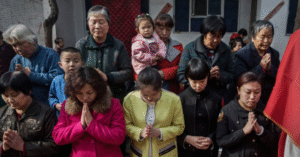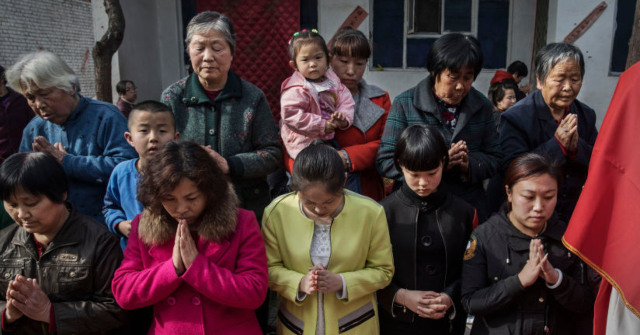Chinese officials on Tuesday arrested 18 leaders of the underground Zion Church. Almost 30 pastors and staffers have been detained, without formal arrest, since the middle of October.
Zion Church is an underground or “house church,” meaning it has not been authorized and controlled by the Chinese Communist Party. The Chinese government is using a technique called “Sinicization” to take control of organized religion and make it subordinate to Communist Party doctrine. “Sinicized” churches, mosques, and temples are forced to teach Communist dogma in addition to their religious beliefs.
Millions of Chinese Christians have bravely chosen to defy the system by worshiping at “house churches,” so-called because they typically hold services in the homes of their congregants. The Zion Church was founded in 2007 by Pastor Ezra Jin Mingri, who converted to Christianity after the Tiananmen Square massacre in 1989.
Jin’s church grew rapidly during the Wuhan coronavirus pandemic by offering services online — and even by defying dictator Xi Jinping’s harsh lockdown policies to hold services in person. Zion Church is now one of the largest remaining underground churches.
Xi’s regime launched its biggest crackdown on house churches in years this October, detaining dozens of pastors and staff members, including Pastor Jin. Five of the detainees were released in October and four more were released on bail in early November, according to Jin’s daughter Grace.
The other 18 prisoners were formally arrested and charged with “illegally using information networks” on Tuesday. Christian non-governmental organization (NGO) ChinaAid denounced the charges as “politically motivated.”
“These pastors and co-workers are being treated as criminals simply because they faithfully shepherded a large, legally unregistered church that refused to submit to CCP control and surveillance,” ChinaAid said in a statement.
ChinaAid founder Dr. Bob Fu said the Zion Church crackdown marked a “chilling milestone in the Chinese Communist Party’s all-out war on Christianity in China.”
“Their only ‘crime’ is preaching the Gospel of Jesus Christ, shepherding God’s flock, and refusing to turn Christ’s church into a propaganda tool of the Communist Party,” said Fu.
“By turning pastors into political prisoners, the CCP is not only persecuting these individuals and their families — it is sending a warning to every independent church in China: submit to Party control or face destruction,” he said.
Over 500 church leaders from 45 nations signed an online petition on Tuesday calling for the release of the imprisoned Zion Church members. Many of the signatories were from countries that belong to China’s Belt and Road Initiative (BRI).
The petition called on Chinese leaders to “recognize that religious freedom strengthens, rather than threatens, nations,” and to work toward a future where “Christians in China can worship freely, serve their communities openly, and live out their faith without fear.”
The U.S. Senate passed a bipartisan resolution on Wednesday condemning the arrests of Pastor Jin and the other Zion Church members.
“Everyone deserves the right to practice their religion freely without fear. I’m glad the Senate passed this bipartisan resolution to call for the Chinese government to release Pastor Jin, Ekpar Asat, and all political and religious prisoners,” said Sen. Chris Coons (D-DE).
“Christians are fighting daily for their religious freedom against the Chinese Communist Party. Last month, the CCP carried out its largest nationwide crackdown in over four decades against a Christian house church in China. I’m grateful to Senator Coons and my colleagues for standing with me to demand Pastor Jin and his congregation’s release and to make clear that any government that fears faith is tyrannical,” said Sen. Ted Cruz (R-TX).
Other Republican and Democrat sponsors of the resolution condemned the Zion Church crackdown in similar terms. Sen. Shelley Moore Capito (R-WV) said it was important to send a “clear message that faith is not a crime.” Sen. Tim Kaine (D-VA) said the arrests were “part of a broader pattern of the systematic suppression of any religious authority or group seen as independent of the state.”
Read the full article here



